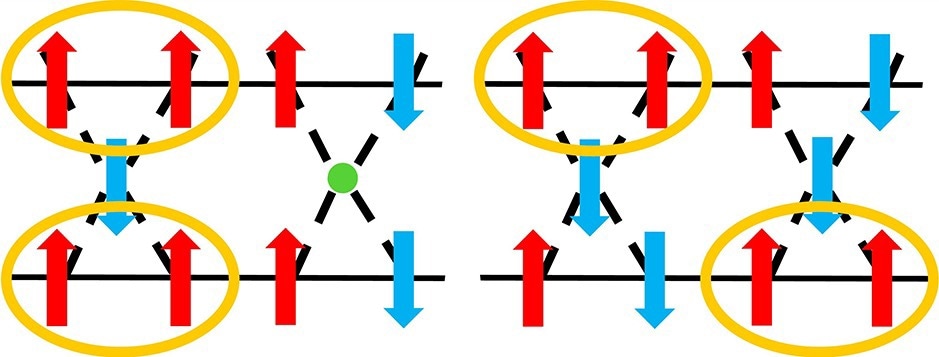A collaborative group from D-Wave Quantum Systems and Los Alamos National Laboratory conducts experimental research to investigate the paradoxical role of fluctuations in causing magnetic ordering on a network of qubits.

A cropped representation of two configurations of the asymmetric hexagonal lattice the researchers studied, with strong antiferromagnetic couplings shown along parallel lines and weaker diagonal couplings illustrated as dashed lines. Each red or blue arrow represents a logical qubit hosting a magnetic moment oriented either upwards or downwards. The two configurations have the same internal energy but different entropy as a result of the floppy qubit — shown here as a green dot — which has an undetermined orientation for the qubit magnetic moment. Image Credit: Los Alamos National Laboratory
The group discovered that fluctuations can lower the overall energy of the interacting magnetic moments using a D-Wave quantum annealing platform. This discovery may contribute to a decrease in the cost of quantum processing in devices.
In this research, rather than focusing on the pursuit of superior quantum computer performance over classical counterparts, we aimed at exploiting a dense network of interconnected qubits to observe and understand quantum behavior.
Alejandro Lopez-Bezanilla, Physicist, Theoretical Division, Los Alamos National Laboratory
Promoting Order by Adding Fluctuations
The team's investigation into the intricate interactions of roughly 2,000 qubits inside an asymmetric hexagonal lattice is detailed in a paper published in Nature Communications. They investigated the effects of the tiny magnetic field produced by the superconducting qubits, as well as other factors that usually cause disorder in magnetic moments.
The group applied fluctuations, which represent dynamic shifts in the orientation and configuration of magnetic moments, fueled by temperature-related thermal effects as well as quantum phenomena brought about by the application of an external magnetic field. This gave them the opportunity to experiment on their designed "frustrated" magnetic lattice with entropy, magnetic moments, and disorder.
The findings supported a counterintuitive theory: Configurations with a clustered defect distribution become the more frequent state under certain physical settings, refuting accepted notions about the connection between disorder and entropy.
The team was able to show in a quantum system that ordered states characterized by particular patterns can emerge, akin to the "order by disorder" process, even when seemingly disorder-inducing factors are present, defying the popular belief that configurations with higher entropy should exhibit greater disorder.
The idea that we could promote order by adding thermal fluctuations and even enhance it by adding quantum fluctuations may seem paradoxical, but we have been able to observe in detail how fluctuations influence the mechanisms and physical conditions leading to defect clustering. That insight can point us to improvements in the way quantum systems are built.
Cristiano Nisoli, Study Co-Author and Laboratory Physicist, Los Alamos National Laboratory
Future Work on Quantum Fluctuations
Future advancements in the D-Wave quantum platform and experimental capabilities will free scientists from the simultaneous influence of thermal fluctuations and enable them to concentrate only on the function of quantum fluctuations.
The research was funded by The Laboratory Directed Research and Development program of Los Alamos National Laboratory.
Journal Reference
Lopez-Bezanilla, A., et al. (2024). Quantum fluctuations drive nonmonotonic correlations in a qubit lattice. Nature Communications. doi.org/10.1038/s41467-023-44281-0.